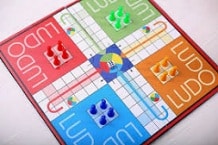Latin is where we can establish that the etymological origin of the term ludo that concerns us now is found. Specifically, we have to emphasize that it derives from “ludus”, which can be translated as “game”.
Ludo is a board game . It is an entertainment that is based on the use of a board with numbered squares and four exits: each participant has four pieces that they must try to take to the central square, advancing according to what is determined by a dice .
 The name ludo is used in Venezuela , Uruguay , Peru , Chile and Argentina . In other countries , the game is called Parcheesi , a word derived from the Hindi pacīsī .
The name ludo is used in Venezuela , Uruguay , Peru , Chile and Argentina . In other countries , the game is called Parcheesi , a word derived from the Hindi pacīsī .
This would be the case of Spain. And Parcheesi is precisely what a children's musical group that was successful in the 1980s was called. It was made up of boys and girls, each of whom was always dressed in one of the colors of the aforementioned game.
The objective of ludo is to move four pieces from the starting point to the center of the board , where the finish line is located. The pieces move from left to right.
The game can be played with one or two six-sided dice . In turn, the player must roll the dice: according to the number he rolls, he will move the pieces one at a time. At the beginning, 6 is the number that marks the start and grants an additional turn. Then the token will move as many squares as indicated on the dice.
When a player reaches a square that was occupied by another participant, he makes the latter's pieces return to the starting area. There are, however, safe spaces on the board where capturing pieces is not possible.
Other interesting information about the game at hand are the following:
-It is considered one of the most popular games in the world.
-It is believed that its creator was the conqueror of India in the 16th century. We are referring to Akbar the Great. Specifically, it is considered that he shaped it in the year 1570 based on the garden of his palace and the way to reach Akbar's throne, the center of it. The tokens he used were maidens, which were carried on horses by knights, and instead of dice he used cowrie shells.
-The English were some of the first inhabitants of the world to become fond of ludo or ludo. Specifically, it is considered to have become the preferred game at meetings of all kinds.
-Throughout history there have been very relevant figures who became fond of this game. This would be the case, for example, of Napoleon Bonaparte and even Louis XIV of France.
It should be noted that there are several versions of ludo. One of the most popular is called royal ludo , which is played with two dice (one special) and whose board also has boxes with special characteristics .
Nowadays it is not only possible to have fun with Ludo as a board game: there are also digital variants to play over the Internet .
